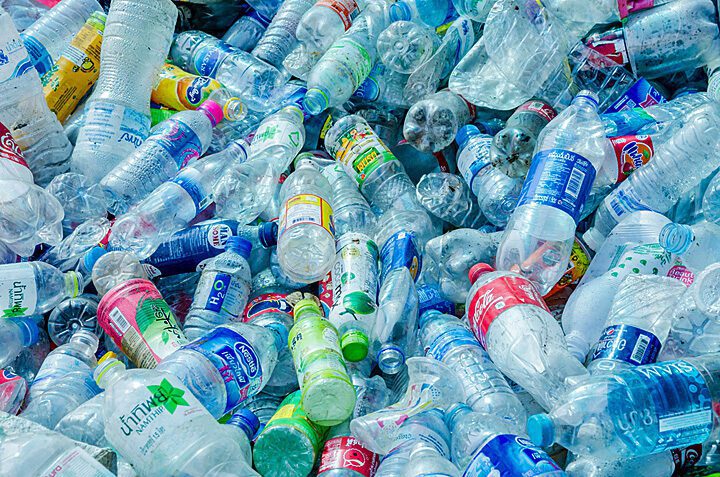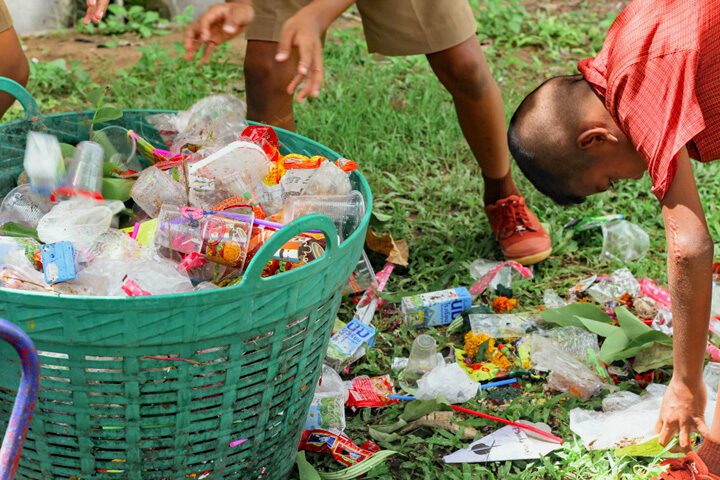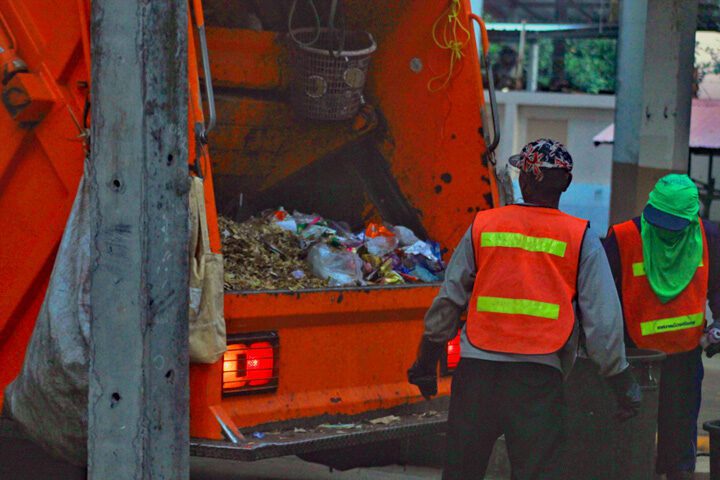Deposit in Thailand
In the XNUMXs, my father was a warehouse manager at a VIVO wholesaler. You have to be a bit older to know that VIVO was a grocery store, just like Albert Heijn, de Gruijter, Simon de Wit, VéGé, De Spar, Sperwer and Co-op.
Supermarkets did not yet exist, let alone hypermarkets and pasture shops. I remember an inscription from a shop: Grutterswaren en Comestibles.
Many products in that store, such as sugar, salt, beans, peas, were packed manually in a cone (one pound) or a larger brown bag (1 kilo). Many other products were delivered in bottles and glass jars, on which a deposit had to be paid. If you returned the bottle or jar, you also received the deposit, which was never more than a quarter.
Packaging
In his position, my father was also responsible for “empty goods” or also referred to as “packaging”. The cars, which had made their deliveries in the region, brought the empty goods to him. He sorted it by size and brand, packed it in boxes and then sent it back to the factory at regular intervals.
As a little boy, I was (had to) sort those empty bottles on my free Wednesday afternoon: Abro and Ozon bottles from De Fenix Zwolle, liqueur bottles from Siebrand Kampen, lemonade bottles from Exota, round biscuit tins from Nobo Ede, large biscuit tins from Kaiser Dordrecht, jam jars by Flipje Tiel, etc. Nice? No, not really, I don't think I got any money for it either, although the biscuits left in those tins made up for it somewhat.
Trade in empty bottles and cans
I constantly think of that time when I look around Pattaya. There is no real deposit Thailand, but there is “a lively trade” in empty bottles and cans. The production of all that empty good is not insignificant, just think of the countless beer bars, discos and restaurants that produce a veritable mountain of empty bottles and empty cans every day.
Every morning you see a large number of pick-up trucks driving through the city to collect that packaging for a fee. They are independent “entrepreneurs”, who pay you about half of what they get from the wholesaler. I don't know all the prices, but I know that a box with 24 empty Heineken bottles costs 15 to 20 Baht and empty cans 2 for 1 Baht. That doesn't seem like much, but take it from me that it generates a lot of money every day because of mass consumption. My wife has a mini-mini market, where the residents of the apartment complex empty a few to many beer bottles every day, and that yields more than 14 Baht every 500 days. Often the "deposit" goes to the service staff, but not every boss is so nice and puts it in his own pocket.
The lesser gods, who cannot afford a pick-up truck, drive a moped with a sidecar through the residential areas to collect those empty bottles and cans from private individuals. These are not always beer bottles, the bulk of which are water bottles and lemonade cans. In passing, they also dive into the large waste bins that are in the neighborhood and that also yields a lot. These people also like to take your discarded washing machine, couch, radio and what not, because everything can be sold elsewhere.
Poor slobbers
The next wave to wash over Pattaya are the poor wretches, who use a large plastic bag to cover all the waste bins in the city along the beach and roam the residential areas. Not so long ago I even saw a Farang with a plastic bag walking along the boulevard, diving into every rubbish bin for a few empty bottles. I thought it mine. With a full bag, collected after a tough number of kilometers of walking, it still yields those men and women 20 to 50 Baht, with which they can buy a plate of rice and/or a few cigarettes. That group sometimes finds a not entirely empty whiskey bottle, especially on the beach, and think for yourself what happens to that last bit of whiskey.
The last in line are the garbage collectors, who drive through the city in their big cars, you see them 24 hours a day. The bins are emptied, all bags are cut open, the men stand with their feet in all that terribly smelly garbage and fish out all "valuable" things, such as bottles and cans. You see a garbage truck, which is full on its way to the collection point, packed with large plastic bags packed with their loot.
Recycling
All in all, I think that the recycling of bottles, cans and the like is handled well in this way, the return percentage could well be close to 100. The other rubbish, rubbish, which you find everywhere and which is a daily annoyance of mine, I shall not speak of now, perhaps another time.
– Reposted article –





I pre-sort all the rubbish, white glass, brown glass, plastic bottles, cans, cardboard, electrical equipment, etc. and put it in separate bags in the rubbish bin. The people of the garbage truck are very happy with it. Beer and Laos Khao bottles in the original box will earn them a few extra baths. Batteries I have found 1 place where they are recycled. If you do this like this, you actually have very little real garbage left.
Nico B
If, as in many countries, a deposit is charged, you need a return cycle. That's quite complicated. What to see in Thailand: money for certain packaging materials may be second best !
We also sort the plastic from the other waste and put it neatly separately with the rubbish. After which it is thrown back with the other garbage when collected
we have a project in Nongkhai that saves you all plastic bottles and possibly glass and brings you to the temple once a month, in our case Wat Meechai.
This project is for poorer people, so we saved for our grandmother, who passed away on March 2, 16 after a 2021-year illness.
We received a check from Wat Meechai at the cremation for baht 27535. We thought this was a very large amount as we do not drink alcohol and have only returned empty water bottles over the past 2 years.
This Project is still running in Nongkhai.
Forget a few more items, I deliver metals separately, kitchen waste and small garden trimmings go in the compost bin, coarse garden trimmings to a family site, there it composts.
Great that many have a merit and thus a lot of waste does not end up on the belt.
Nico B
I also collect all the glassware and plastic. Hand it in once a month to a female who walks around with a cart. I don't need anything for it. I see it as a contribution to charity
I am on the road every day by bicycle. I don't want to say that Thailand is a dirty country, but Thai people are dirty people. The collection service comes every Thursday and yet the irrigation canal is the ideal place to dump the waste. In Cm, the garbage is even collected 3 times a week.
Driving along the roads I see that the bushes are used as a rubbish dump. Full plastic bags are left along the road, even mattresses.
Thailand is a beautiful country but the Thai don't respect it. There is still a LOT of work to do.
Yesterday I was in a place, in the middle of the neighborhood, it stinks of the garbage. Was placed on a children's playground by the municipality or the project developer. Wouldn't even want to live there for free.
I have to protest here. Yes you are right that many Thais don't take it too seriously and quickly dump their rubbish. But that is mainly because there is hardly any supervision by the government. In the Netherlands they even come to visit you at home, when they find an envelope with your address in the paper box that you put out of necessity with the unemptied paper container and you get a fine.
Were it not for the fact that there were fines for litter and campaigns to combat this had not been held for years, it would not be any better in the Netherlands either.
Even worse: years ago I lived in Germany for about five years. When I came back to the Netherlands, I was amazed at the mess I found there. Cigarette butts were carelessly thrown away, smokers on the move emptied their ashtrays on the ground in parking lots, chewing gum everywhere. No, it could be better.
The Netherlands is a rich country and the government can do and tackle a lot. That is not a priority here in Thailand (and in all developing or threshold countries). So a lot of dirt remains.
What I love here is that I can take my collected bottles, plastic, paper and even cooking oil to a place and we get a few more baht for it. You not only have to pay for the same waste in the Netherlands, but you are also obliged to dispose of it separately. People are always surprised that people in the Netherlands have to pay to throw away rubbish.
I agree that Thailand still has a long way to go. I only hope that it will be a better solution than in the Netherlands, where you now have to pay for everything, including the plastic bag in the supermarket. We use it here as a garbage bag. In the Netherlands you pay for it and you also have to buy separate waste bags, because only standard bags are used for your plastic!
By the way, here I also do something that has long been out of the question in the Netherlands: I burn my garden waste. In the corner of the garden I have two large concrete barrels, in which I dump all the grass and other garden waste. It dries quickly and every few months I set fire to it. It then smolders for a few days and finally I have good ashes to use in the garden. This aside…
SjaakS, great what you are doing and I agree with your thoughts about NL. It is a pity that you burn garden waste, the residue after combustion can indeed be used in the garden, but it is about the lowest-quality fertilizer. Burning it is very environmentally unfriendly, you could also deposit it in a compost bin, you don't have to buy it, you don't pollute the atmosphere and you have a fertilizer product. Up to you, of course, what you do.
Groet
Nico B
You're probably right, but I've been trying to “compost” for three years… I can't do that here, not like in the Netherlands. And since we have quite a thick layer of clay on the ground, I can mix the ashes with the ground to loosen it up a bit.
Is it really that bad for the environment to burn something? There is hardly anything left of it and I don't have that much anymore..
If I have a better alternative, I want to try it right away… 🙂
SjaakS, hope the moderator doesn't see this as a chat. Have a look at this site: http://www.velt.nu/composteren. You can also deposit your kitchen waste with the garden trimmings, see this site also vwb. what not to put in kitchen waste.
The clay soil becomes considerably looser from compost than from ash, also add some clean sand or rich soil to your compost, which also loosens the clay.
Yes, it is bad for the environment to burn something, smog is partly due to low-temperature combustion.
Be patient, composting takes some time.
Good luck.
Nico B
Burning is also nice if you have neighbors nearby who try to keep the stench and the junk that blows away outside the door and with the Thai architectural style you will still smell it inside.
We have a farmer just outside the resort who does it from time to time (burning it in case anyone thinks I mean something else) and the whole resort (enjoys) in the stench and smog.
Making compost takes 1 year and during the dry period, keeping it a little wet... and adding worms speeds up the process... You no longer need fertilizer in the vegetable garden.
Ash is also a good fertilizer, good for the soil
In Nongkhai the street is swept every morning at 0400 hours 7 days a week.
Every morning between 0500 and 0600 a garbage truck comes by to take all the rubbish.
Come along with that in the Netherlands.
total cost Free
Yes, they know deposits in Thailand, only to a limited extent.
The thin bottles of cola and fanta that are often shaken in a plastic bag with ice in them have a 5 Baht deposit.
There is also a deposit on some soda bottles. So the sentence with ::
There is no real deposit in Thailand, that's not true.
Yes, that's right…and the soda is cheaper too. I buy a crate at the local shop and, after deducting the deposit, I pay less for the same number of bottles of soda than for the macro's disposable bottles, which also have a smaller content.
We have also used the soda from the deposit crate for a while.
Dirty crates. Dusty bottles. Rust on the caps and less bubbles / pressure on the water.
Now we just use the disposable bottles again.
We separate all our waste, plastic, paper and cans.
That goes in large transparent bags and we put it near the road.
Usually gone within 20 minutes
Hallo,
I do it even differently where I live in Pattaya.
We put the empty bottles and cans separately in a plastic bag every two days just next to the door of our flat, every two days an old motorbike taxi driver comes to pick them up at 5 o'clock in the morning… so my girlfriend only has two plastic bags with kitchen waste that we deposit in the barrel next to the Familymart just next door.
Rudy.
I wonder what they end up doing with all those empty bottles.
Dump the whole trade into the sea?
For the past few months I have been using a method that has dramatically reduced our plastic waste. I think we now have at least 80% less waste.
Why? We used to buy bottled water (Makro, the cheapest, own brand). We also often exchanged two empty large bottles for full ones, but that water has a less good taste.
A few months ago I bought and installed a filter installation and we have been drinking filtered tap water ever since. No bad aftertaste, but above all no more mountains of plastic bottles….
there is talk of tinplate, but this also has to be separated aluminum yields more than metal.
The garbage collectors, we kind of look down on them, but these people have to buy in to become a garbage collector, 10 years ago it was 5.000 Bath buy-in.
I myself have experienced a man with a Saleng (sidecar) upside down in the garbage cans, after half a year he was an entrepreneur, he had 2 female employees, who then stood upside down and he already had the saleng.
Still, I'm afraid that fundraising will go under because of its own success.
We also keep everything separate, plastic, cans and cardboard.
Because we receive quite a lot of cardboard in the store, we sell it ourselves.
About 4 years ago the price was still 4 Thb per kilo, now only 2,5 Thb per kilo
Plastic and iron I don't know, we put that separately on the road and someone always took it away in no time
Well written and recognizable, chapeau.
Entertaining and interesting/recognizable for us old guys.
Vivo, Gruyter + et cetera, always evoke memories of these not so fast times with us.
Lived in the city of Groningen in the 50s, 95% of the traffic was walking, cycling.
The middle class with horse and carriage.
Good old memories from the time when hardly anyone owned more than the luxury of a bicycle.
Where can batteries be returned in Pattaya/Jomtien?
My wife keeps the empty beer / whiskey bottles and the cardboard in her neighborhood shop.
The rest goes in the bins outside, which is picked up by an old deaf man.
Have you ever kept it all yourself?
A large garbage bag was full then something like 50 A 60 baht.
If the men have a 'good' route, life is not bad.
People often give a little money or a meal while driving by.
The big question is, of course, where does that plastic go once it has reached the big traders where these poor people bring it.
In fact, read only short-term solutions often for your own gain.
The perpetrator is always out of harm's way.